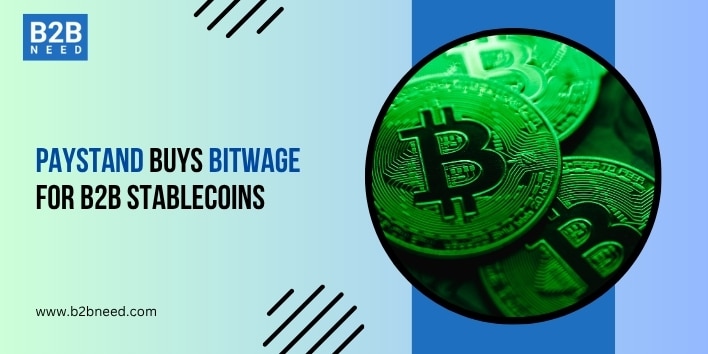Paystand, a leading B2B payments platform, has acquired Bitwage, a blockchain-based payroll and global payouts company, in a move set to transform B2B stablecoin payments. This acquisition is intended to bring enterprise grade stability, speed and programmability to the world of business finance so that companies can make and receive cross-border payments efficiently.
Jeremy Almond, CEO of Paystand said: “Stablecoins are moving from being a curiosity in the crypto world, to becoming a regulated and enterprise-ready money.” What’s been missing is a one-to-many secure network for real-world B2B payments – supplier invoices, trade and treasury operations. This acquisition is the solution to that.”
Jonathan Chester, CEO of Bitwage added: “By joining Paystand, we are able to bring the B2B stablecoin payments now enabled for payroll and vendor payments to the enterprise level.” On-chain dollars which are no longer an experiment – they are working capital for global businesses.”
Why This Acquisition Is Important for the Global B2B Finance
The combination of Paystand and Bitwage is a platform with two complementary strengths:
- Bitwage’s stablecoin cross-border payment engine: $180.00 USD Today’s Currency I am being paid in EUR tomorrow in: 90,000 recipients. 4,500 businesses. Nearly 200 countries.
- Paystand’s enterprise blockchain network: $20 billion payment volume, more than 1,000 enterprises, one million businesses worldwide.
There is a rapid increase in the adoption of stablecoins. Inspirit of institutional trust and regulatory progress, activity in stablecoins near $9 trillion in 2025 which was an 87% year on year increase. By bringing these networks together, Paystand is on the cutting-edge of programmable, global B2B payments, allowing companies to settle invoices, manage their treasury and FX operations with an unprecedented speed.
For finance teams, this is not just an adoption of technology but a complete change the way enterprises transfer money from one country to another. Manual transfers, intermediaries and high fees are being replaced with automated, transparent and close to immediate settlement.
Important Capabilities Made Possible by the Combined Platform
Paystand-Bitwage integration has a number of enterprise grade features:
- Global vendor payouts: Send value in USDC, USDT, BTC, ETH, or local currencies across ~200 countries.
- Automated AR/AP workflows: Streamline receivables and payables while reducing errors and reconciliation overhead.
- Programmable treasury management: Move liquidity dynamically across subsidiaries, currencies, and geographies.
- Compliance and governance: Enterprise-ready rails align with U.S. GENIUS Act, EU MiCA, and global licensing frameworks.
- Scalable API integrations: Seamless connection with ERP, CRM, and financial systems for full automation.
All these capabilities enable the CFOs and finance teams to consider payments as a strategic leverage rather than the operational overhead, while the marketing and operations teams get more predictable cash flows for campaign execution.
Strategic Advantages for Finance and Marketing Departments
While the acquisition has direct benefits for finance teams, Marketing and operational functions also gain important benefits:
- Faster vendor payouts for marketing campaigns: Global agencies, creatives, and localization partners can get paid for marketing campaigns near-instantly, resulting in less delay getting a campaign up and running.
- Enhanced vendor engagement and retention: Consistent and programmable payment rails make the partners happier which strengthens the supply chain for global campaigns.
- Tighter alignment between spend and outcomes: Programmable payments give the ability to track campaign budgets, ROI and supplier performance on a real-time basis.
By bridging the gap between treasury, finance and marketing, enterprises can now align the movement of money with business strategy and financial operations can now be a growth enabler rather than a bottleneck.
Regional Implications: India, APAC B2B Market
The impact of the acquisition goes beyond the United States, and especially in emerging markets such as APAC and India, where cross-border payments are slow, expensive, and opaque.
- India’s B2B commerce is growing rapidly, as businesses are increasingly working with global suppliers and remote partners.
- Stablecoin-based rails reduce dependence on intermediaries, enable near-instant settlement, and reduce FX friction.
- Enterprises taking up Paystand + Bitwage can benefit from acquiring competitive advantage through better supplier relationships, and tighter campaign execution timelines.
This demonstrates that B2B stablecoin payments are not just a Western enterprise innovation they have immediate relevance in high-growth markets.
Challenges and Considerations to Enterprise Adoption
There are clear promises, retention will be difficult: It is not a blank cheque for easy cash:
- Integration complexity: Enterprises must integrate new stablecoin rails with legacy ERP and treasury systems.
- Regulatory compliance across jurisdictions: Companies must monitor evolving rules in APAC, EU, and North America.
- Partner readiness: Not all suppliers may accept stablecoin payouts initially, requiring dual rails or conversion mechanisms.
- Risk management: Enterprises must reconcile stablecoin and fiat transactions, manage liquidity, and address accounting standards.
For the marketing and finance teams, early collaboration is important to help ensure campaign budgets, vendor networks and treasury flows are in line with the new infrastructure.
Looking Ahead: The Future of B2B Stablecoin Payments
The Paystand-Bitwage acquisition is indicative of a larger trend happening in global B2B finance: that stablecoins will be moving from an experimental technology into enterprise-grade money rails.
Trends to watch include:
- Increased adoption by CFOs of cross-border vendor payments.
- Integration with programmable marketing spend and AR/AP workflows.
- Expansion of enterprise treasury functionality to leverage on-chain liquidity.
- Regulatory clarity enabling more countries to adopt stablecoin-based payment networks.
Marketing leaders should now be thinking of payment infrastructure as part of campaign planning, supplier management and ROI measurement.
Key Takeaway
Paystand’s acquisition of Bitwage makes stablecoins a strategic enabler for global B2B stablecoin payments. Enterprises are now able to make faster, programmable, compliant vendor payouts, making treasury more efficient and campaign executions more effective. For the marketing and finance teams behind B2B, this is a particularly important indicator: Payments are no longer merely transactional – they are strategic infrastructure to support growth, engage suppliers, and achieve operational excellence.

